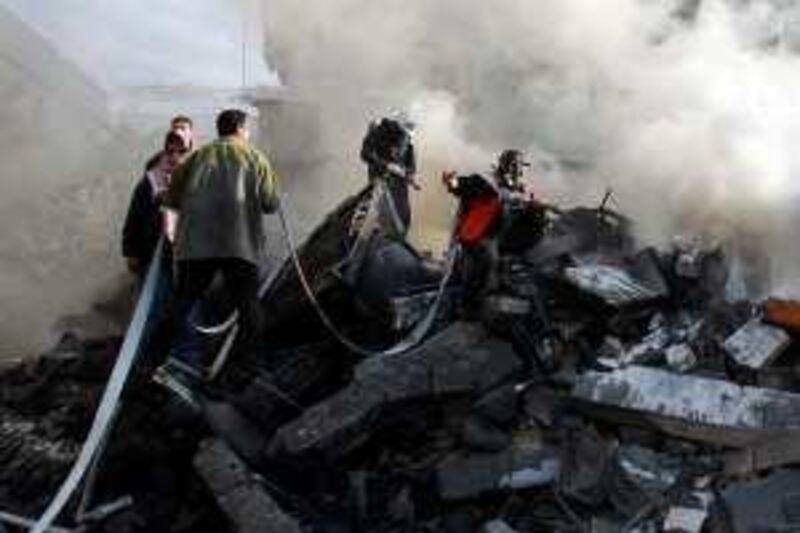RAMALLAH // Six days in, Israel's massive bombardment of Gaza shows little sign of abating. Israeli warplanes have flown more than 500 sorties, killing over 400 Palestinians and wounding hundreds. Israeli bombs have rained down on Gaza's 1.5 million people from air and sea. But with fewer targets left to strike - yesterday Israel bombed a mosque, the education ministry, the transportation ministry as well as the parliament building - a ground invasion would now appear imminent. Hamas spokesmen have been unequivocal about their intention to continue firing rockets until Israel ends its offensive. True to their word, the rocket fire continues, reaching deeper into Israel every day. Four Israelis, three civilians and a soldier, have been killed so far. Israeli spokesmen, meanwhile, have been equally unequivocal that there will be no end to the violence for as long as rockets fly. Neither side will or can back down. There is still time for a ground invasion to be avoided. A concerted international push for a ceasefire could ultimately pressure Israel into staying its hand. But such pressure is conspicuous only by its absence, whether from Arab countries or the West. A half-hearted French proposal for a 48-hour truce to allow humanitarian aid to reach the beleaguered strip and Israel and Hamas to assess their positions was brushed aside by the Israeli government to little protest. It seems that, just as with the 2006 Lebanon war where more than 1,000 civilians were eventually killed, international pressure will only really come to bear should civilian casualties reach some kind of a tipping point. In the crowded Gaza Strip, with no place to run to, a ground invasion will probably see civilian casualties mount dramatically in a short period of time. Israel, however, is unlikely to engage in a full-scale invasion. More likely is a push in certain areas in the south and north in an attempt to cut off any connection to Egypt, Gaza's only hinterland, and to push any rocket launchers further back into the strip. Such a limited operation will also limit the exposure of Israeli troops to direct engagement with Hamas fighters and hence the number of Israeli losses, a central consideration for the Israeli government six weeks before a general election. Indeed, opinion polls show that the offensive so far has been broadly popular among Israelis and has improved the standing of key ministers running for re-election, mainly Tzipi Livni, the foreign minister and, more dramatically, Ehud Barak, the defence minister. One poll indicates that Mr Barak's Labor Party has gained about five parliamentary seats in the past week, while his personal approval rating has soared by nearly 20 per cent. Nevertheless, the same poll also shows that while most Israelis favour a continuation of the air campaign only 19 per cent of Israelis support a ground invasion, the same as support a negotiated ceasefire. Any significant losses Hamas might be able to inflict on the Israeli army could soon turn around the polls, just as happened in Lebanon. For Hamas, the political outlook is considerably narrower. With so many Palestinian casualties, the Islamist movement must secure some kind of gain from the fighting. While support for Hamas appears to be growing as a result of general sympathy with Gazans' plight, once the dust settles Palestinians will want to see that people did not die in vain, a suggestion West Bank Palestinian Authority officials have been keen to promote, even as criticism of Hamas from Ramallah is now being toned down. Only one eventuality can now cause Hamas to agree to put down guns - an opening of crossings into Gaza, whether from Egypt, Israel or both and for more than just humanitarian goods. For this, Israel will want a complete end to rocket fire, so far the only clearly stated goal of its assault, and will possibly throw a prisoner exchange for Gilad Shalit, an Israeli soldier captured in 2006, into any bargain. Cairo has already stated the price Hamas must pay for it to open the Rafah crossing in the south, which is to hand control to the Palestinian Authority of Mahmoud Abbas, the PA president. However, the opprobrium lavished on Cairo from many Arab quarters as a result of that position, notably from Sheikh Hassan Nasrallah, the leader of Hizbollah, will possibly force Egypt to soften its stand, if not abandon it, and a symbolic return of some PA forces to control the Rafah crossing might be enough to satisfy Cairo. That, however, could only happen if Hamas and Mr Abbas' Fatah faction agree to sit down and reach some kind of accommodation, a scenario that under the current circumstances seems unlikely, with some Hamas officials accusing elements in Fatah of collusion with Israel. Nevertheless, an eventual reconciliation between the two rival factions is not only necessary but would be broadly popular among Palestinians. Israeli claims of having struck a debilitating blow against Hamas' capacity to rule Gaza must be balanced against Israeli fears of leaving a power vacuum that no one can fill. In this respect, Israel will likely to refrain from assassinating too many Hamas leaders, bellicose statements from various Israeli officials notwithstanding. The PA will be aware that Hamas control over Gaza, however weakened, will also not be challenged immediately, while Hamas will know that it will need the cover of the PA's international legitimacy to secure an eventual easing of the siege. Such an endgame could have been reached without this level of violence, and would probably be the aim of any outside pressure, should civilian casualties reach a level where the international community is finally stung into action. But it will now probably take weeks, during which military operations can easily snowball out of control. okarmi@thenational.ae
Israel running out of aerial targets
Any ground offensive is likely to be limited to cutting off the border with Egypt and pushing rocket launchers further back into Gaza.

Editor's picks
More from the national




